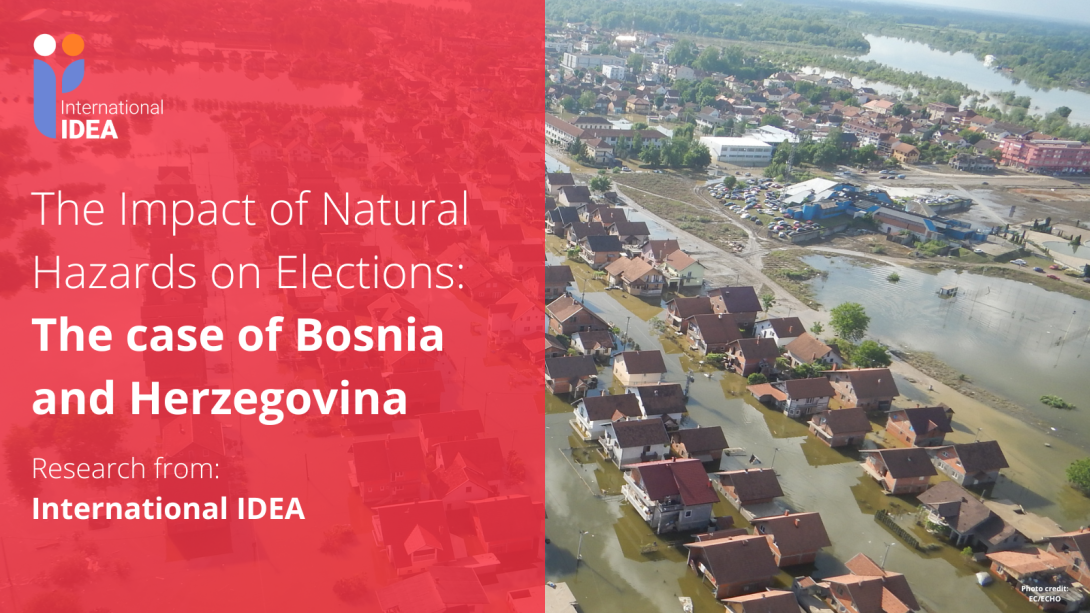
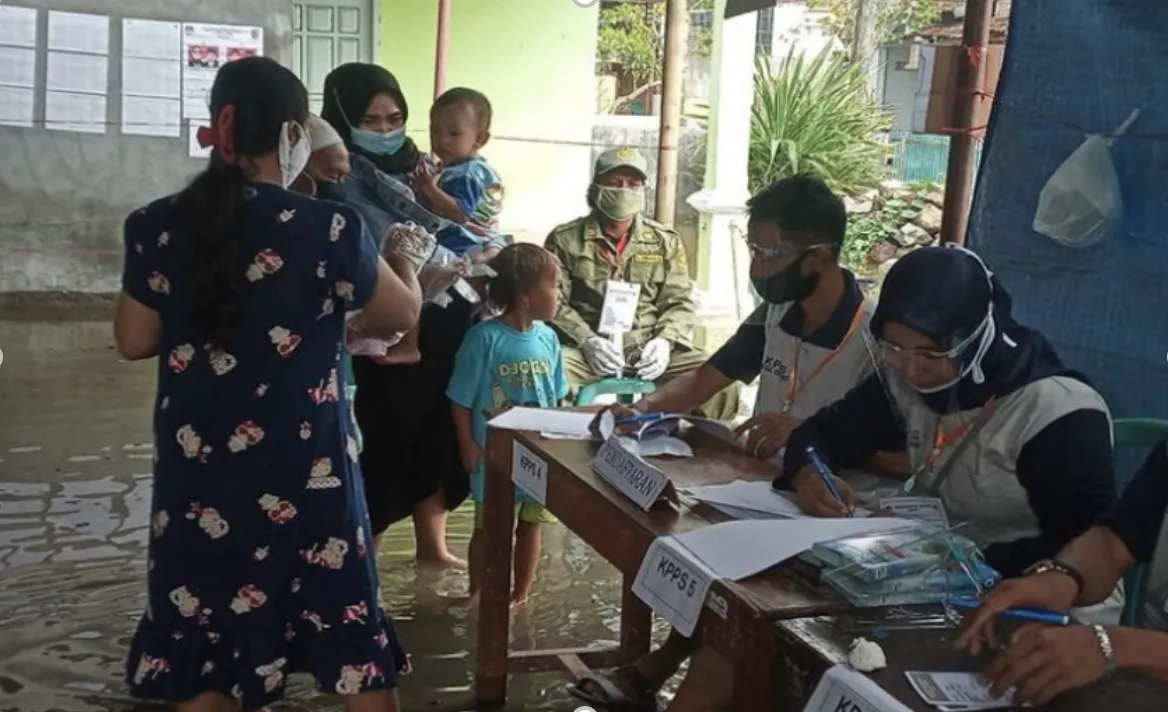
Election management bodies (EMBs) have always had to cope with natural hazards, but the threat posed by such phenomena has become more apparent in recent years. The number of natural hazards, including floods and hurricanes, has tripled in the last four decades. This dramatic development is consistent with the predictions of climate scientists, and it is thus a statistical fact that elections will more frequently be affected by natural hazards in future years.
Analysis
During the 2024 super-cycle year of elections, at least 23 elections, including primary, local, national, and supranational polls in 18 countries, were affected by natural hazards, impacting millions of voters around the world. Countries affected included Austria, Bosnia and Herzegovina, Brazil, Canada, Czechia, Iceland, India, Indonesia, Iran, Kenya, Maldives, Mexico, Mozambique, Nigeria, Romania, Senegal, Tuvalu, and USA. Many of these events were exacerbated by climate change, further disrupting activities at multiple stages of the electoral cycle.
The aim of the report, 'Impact of Natural Hazards on Elections' (which will be updated on a regular basis), is to provide an overview and share various strategies that can be used to protect elections from adverse effects. The report considers natural hazards that are likely to increase with climate change, such as floods, heatwaves, and wildfires, as well as non-climate change-specific disasters such as earthquakes.
Our report - featuring the Election Emergency and Crisis Monitor (EECM), in-depth case studies, feature articles, analyses, publications, and podcasts - will keep you informed and invite your active participation in our ongoing dialogue.
This report was first published on 1 September 2022 and is updated on a continuous basis. Please contact us at elections@idea.int for any further information.
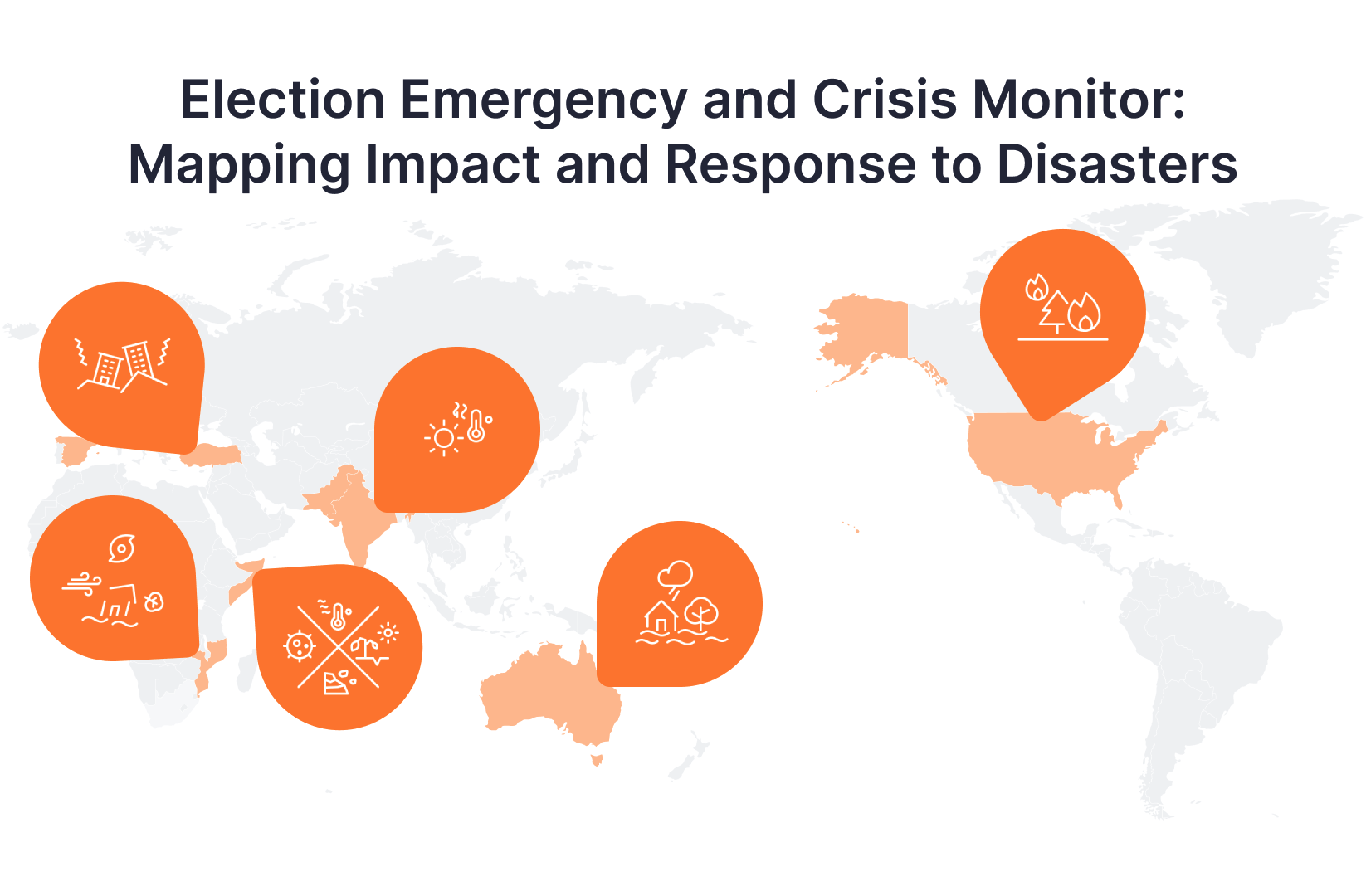
Case Studies

|
THE IMPACT OF FLOODS AND LANDSLIDES ON THE 2024 LOCAL ELECTIONS IN BOSNIA AND HERZEGOVIA Case Study, 12 May 2025 This case study examines the impacts of flooding on the 2024 Bosnian and Herzegovinian municipal elections. Hitting only two days before the election, Bosnia and Herzegovina suffered from catastrophic flooding in central and southern Bosnia in early October 2024. By examining the response from all sides to the flooding, the case study details out the context of the election focusing on the specific actions taken by the Central Election Commission and other stakeholders, the importance of required contingency planning and the value of relationship building as a part of strengthening electoral integrity. |
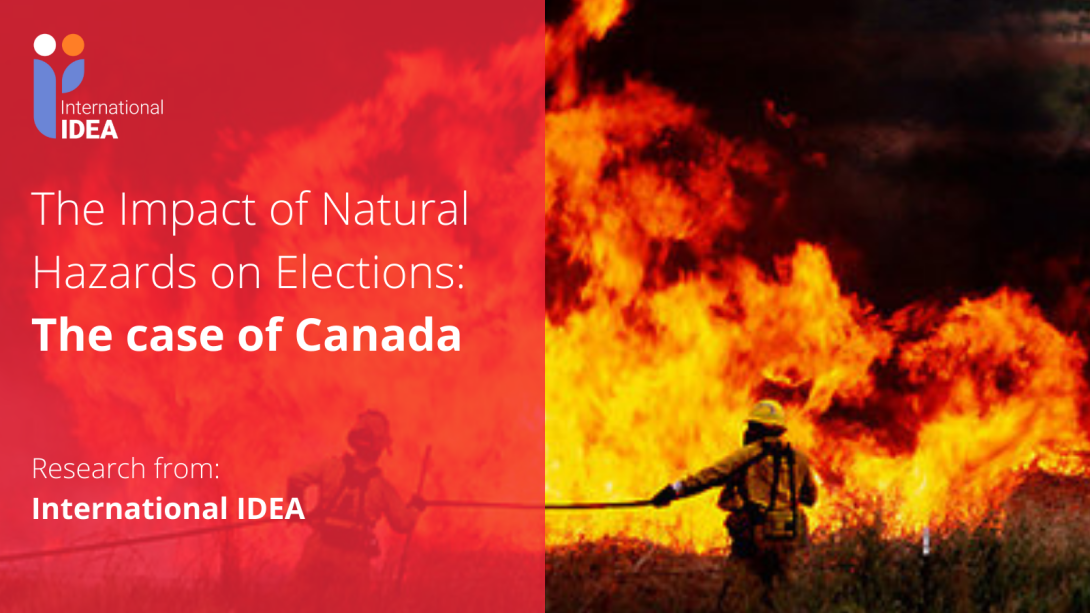
|
THE IMPACT OF THE 2023 WILDFIRES ON SUBNATIONAL ELECTIONS IN CANADA Case Study, 10 February 2025 This case study, examines the effects of natural hazards on EMBs and the administration of elections by drawing on the example of two Canadian jurisdictions. In the summer of 2023, wildfires affected much of Canada, with major cities under the haze of smoke, and towns evacuated from coast to coast. For the Canadian province of Alberta and one of the country’s territories, the Northwest Territories, wildfires occurred during the time of general (subnational) elections, posing significant challenges for their administration and access to ballots. By documenting their election experiences during the exogenous shocks, the case study outlines lessons learned for practitioners and scholars to better prepare and respond in an age where natural hazards are becoming more frequent and intense. |
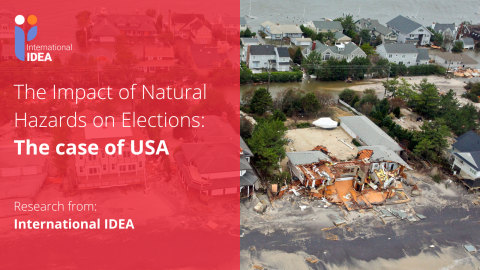
|
WEATHERING THE STORM: HURRICANE SANDY AND THE 2012 US FEDERAL ELECTION Case Study, 30 September 2024 The case study focuses on Hurricane Sandy and the 2012 US federal election and covers key timelines in relation to campaigning, interagency cooperation, special voting arrangements, election day, voter turnout and reforms. This case study analyses preparedness, actions and results on the part of election officials and their election emergency policies in New Jersey and (as a secondary focus) New York, neighbouring state on the East Coast of the United States, as they faced an incoming hurricane ahead of a national election in 2012. |
|
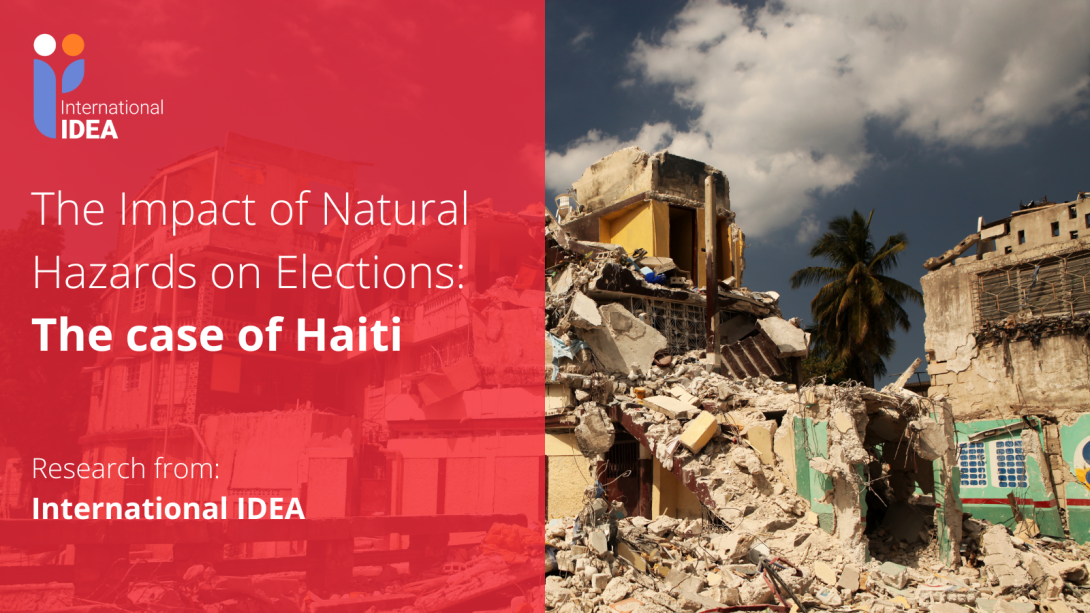
|
THE IMPACT OF NATURAL HAZARDS ON HAITI’S 2010 PRESIDENTIAL AND LEGISLATIVE ELECTIONS Case Study, 1 September 2022 The catastrophic 2010 Haiti earthquake and its subsequent Hurricane Thomas killed upwards of 250,000 civilians, leaving over 1.5 residents displaced. Due to the disaster, about 315,000 identity cards were lost, and challenges related to the distribution of new IDs and purging the voter roll from deceased voters arose. Moreover, the earthquake destroyed critical infrastructure including the headquarters of the election commission and schools used as polling stations. The earthquake also led to the fatality of many election officials which diminished the electoral management bodies capacity to organize elections. This case study demonstrates how catastrophic disasters diminish voter participation, especially when the governing bodies are harmed directly. |
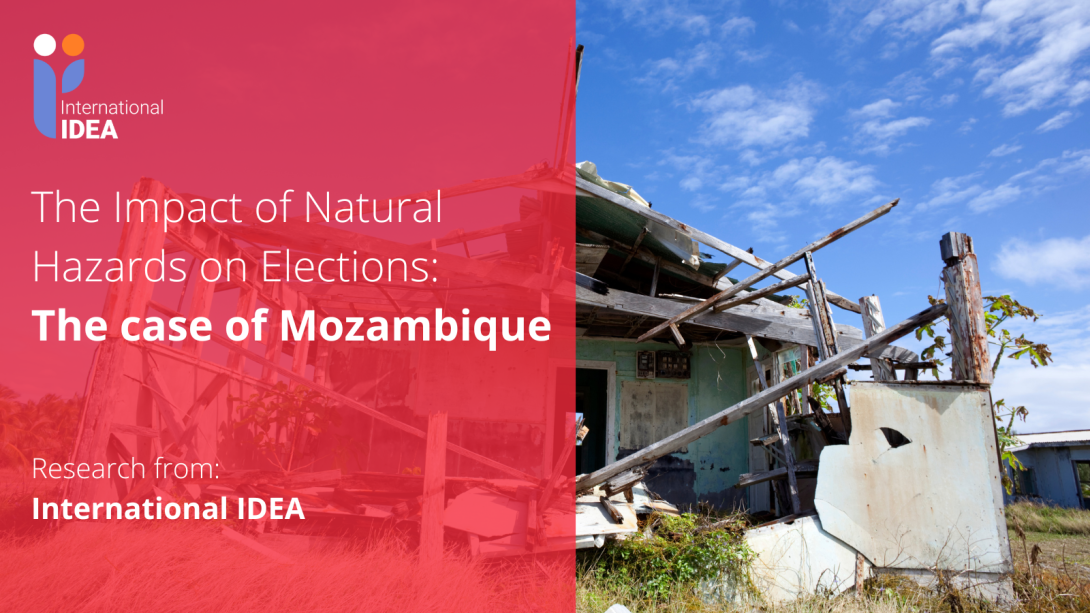
|
CYCLONES AND THEIR EFFECTS ON THE 2019 ELECTIONS IN MOZAMBIQUE Case Study, 1 September 2022 Mozambique is one of Africa’s countries most susceptible to extreme weather, as seen by the 2019 Category 4 Cyclones, Idle and Kenneth, which displaced more than 700,000 civilians. The Cyclone left more than 3,200 classrooms - where most voter registration and counting took place - destroyed. Amid working to counter terrorism in the region at the same time, the Mozambique government rescheduled the voter registration deadline with little legal guidance on how to address the situation. This case study highlights the importance of solid precedents and legal references regarding extreme environmental circumstances to guide legislators and electoral officials during extenuating conditions. |
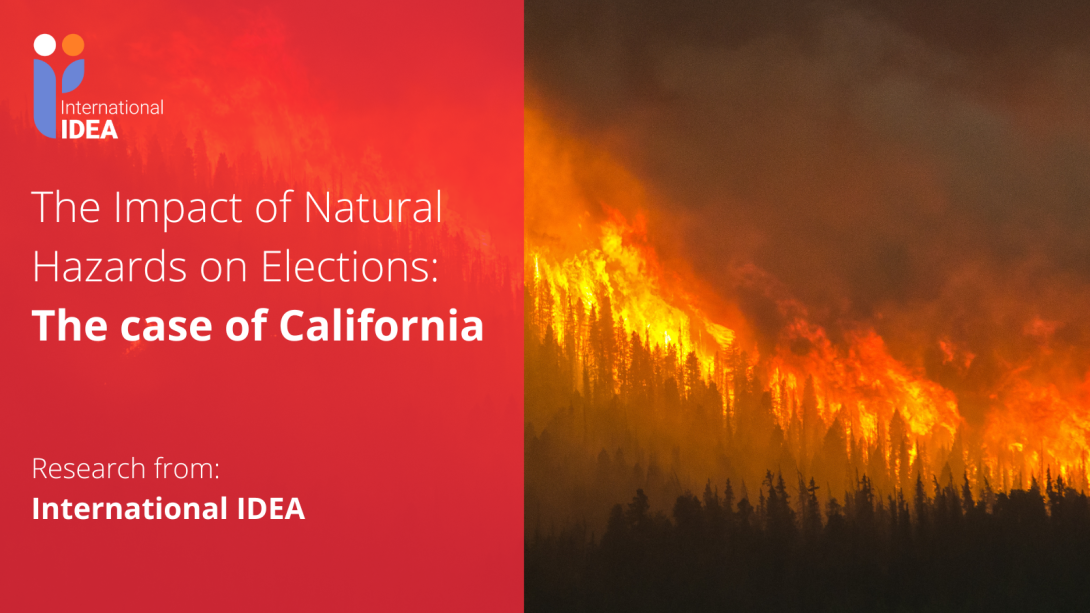
|
WILDFIRE AND ELECTIONS IN CALIFORNIA Case Study, 1 September 2022 Between the fall of 2015 and late 2018, 104 deadly wildfires erupted in California, destroying tens of thousands of structures, displacing 250,000 civilians, and interrupting two of California’s elections. Since wildfires travel long distances, 93% of California’s Counties implemented new procedures for ballot shortages and technological failures. While this case demonstrates the disastrous influence Climate Change has over elections and foreshadows future discussions of rearranging California’s election system, it highlights the importance of contingency planning in elections to avoid disasters impeding on elections. |
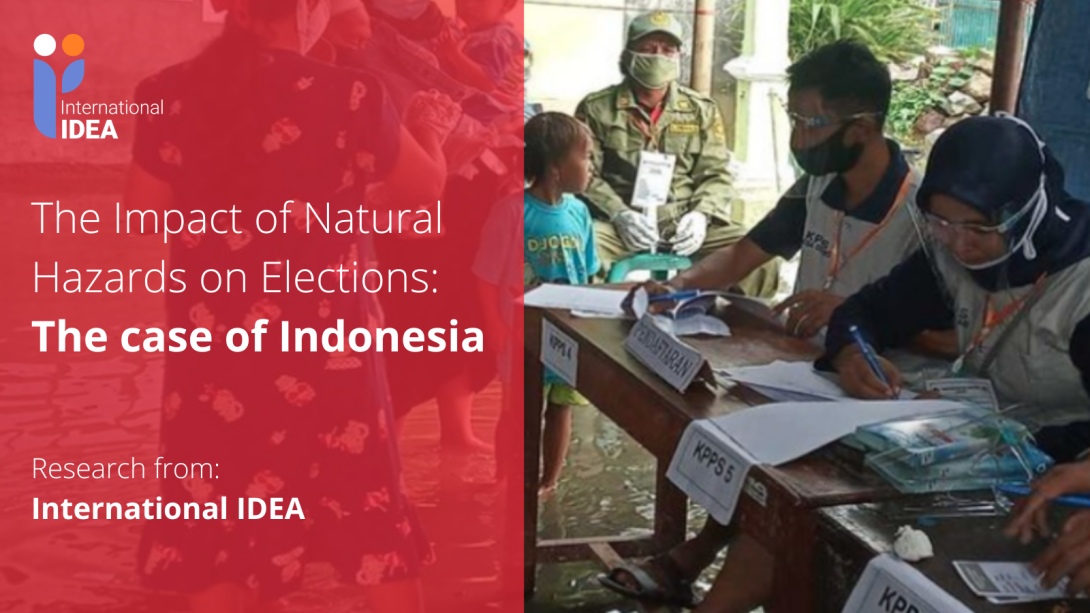
|
TAMING THE TWIN HAZARDS: INDONESIA´S 2020 DIRECT LOCAL ELECTIONS Case Study, 30 November 2022 During the rainy season, Indonesia experiences elevated levels of rainfall, which leaves some areas prone to flooding. In 2020 alone, Indonesia faced 2,745 disasters, including floods, landslides, tornados, drought, earthquakes, forest fires, and volcano eruptions. With only 16% of local election locations safe from flooding and election materials like ballots and voting equipment susceptible to water damage, the election commission implemented measures to lessen the damage of flooding on elections. This case explains the importance of government cooperation with the Meteorology, Climatology, and Geophysics Agencies as well as proper training for poll officials working in disaster-prone areas. |
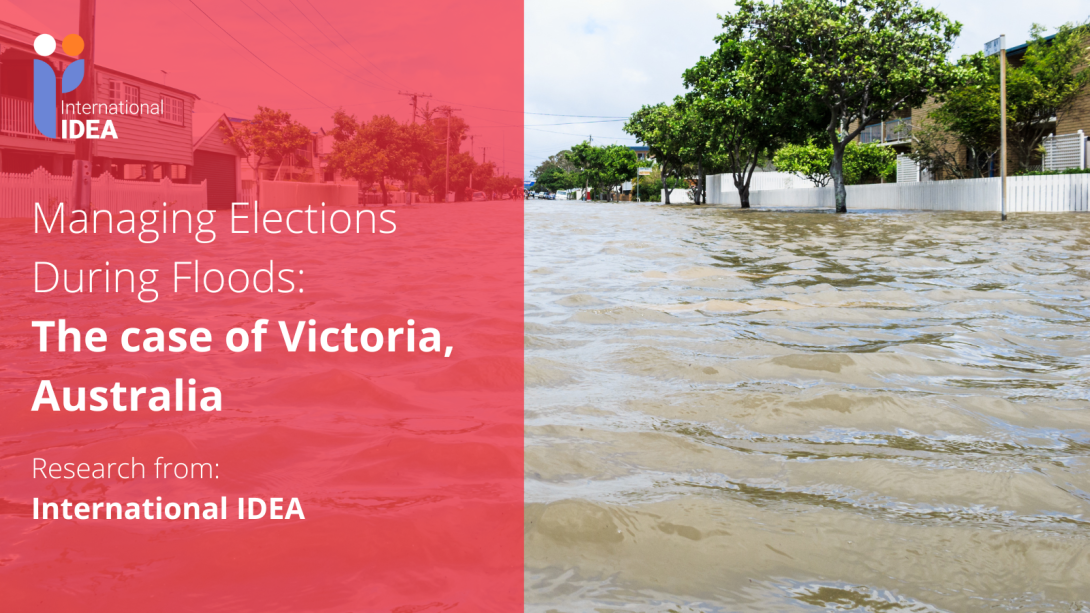
|
MANAGING ELECTIONS DURING FLOODS: THE CASE OF VICTORIA, AUSTRALIA Case Study, 17 July 2023 During September of 2022, Victoria, Australia, underwent extreme rainfall, which led to a 96 percent above average rainfall across the state, with thousands of requests for assistance recorded during October 2022 and 34,000 homes evacuated during the same month. Despite thousands of homes being evacuated, voter registration during the 2022 Victorian Election only decreased by 2% due to the resilience of the Victorian Election Commission (VEC). Although voter participation could have decreased drastically due to flooding, the VEC ensured voters had access to different special voting arrangements such as postal voting, mobile ballot box voting, and telephone assist voting to accommodate extenuating circumstances and maintain voter participation. This case offers insight on risk management and the importance of cooperating with the emergency management sectors and implementing legal frameworks to expand special voting arrangements during unforeseen hazardous circumstances. |
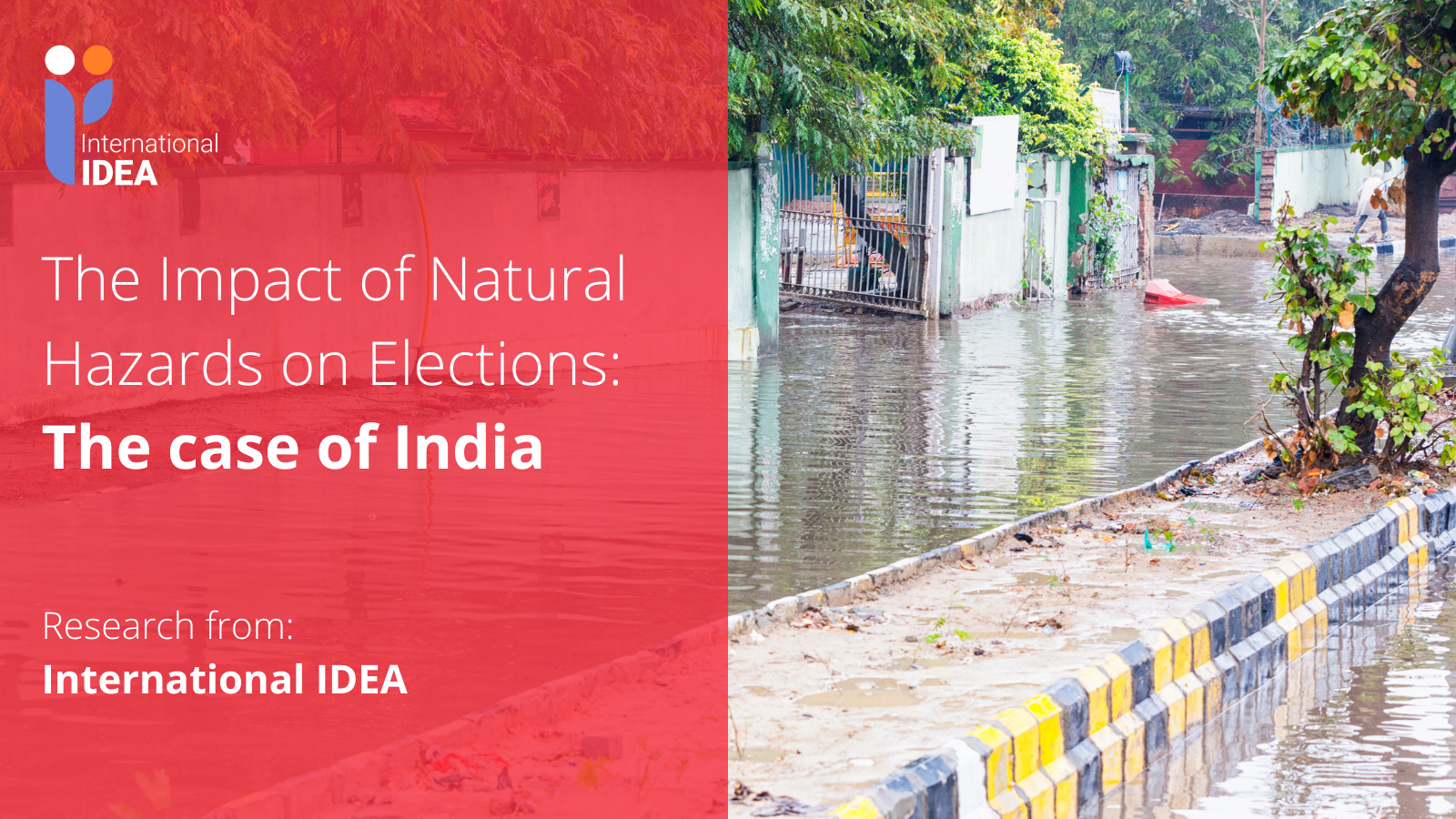 |
NATURAL HAZARDS AND ELECTIONS IN INDIA: LESSONS IN ADAPTATION AND MITIGATION Case Study, February 2024 Climate change and its impacts pose clear threats to elections in India, as seen with the 2019 Cyclone in Odisha State, which forced 1.2 million people to evacuate their homes. In the following 2020 and 2022 elections, in Bihar State and Himachal Pradesh respectively, the government took vital preventative measures to ensure citizens maintained their right to vote in case of natural disaster. This case study makes note of the provisions implemented during crises, including a manual on electoral risk management. This case study explores the effects of the Indian States’ decentralized approach to disaster management and other resilience-building measures. The case also provides some insight into environmental efforts to reduce waste and carbon emissions during elections. |
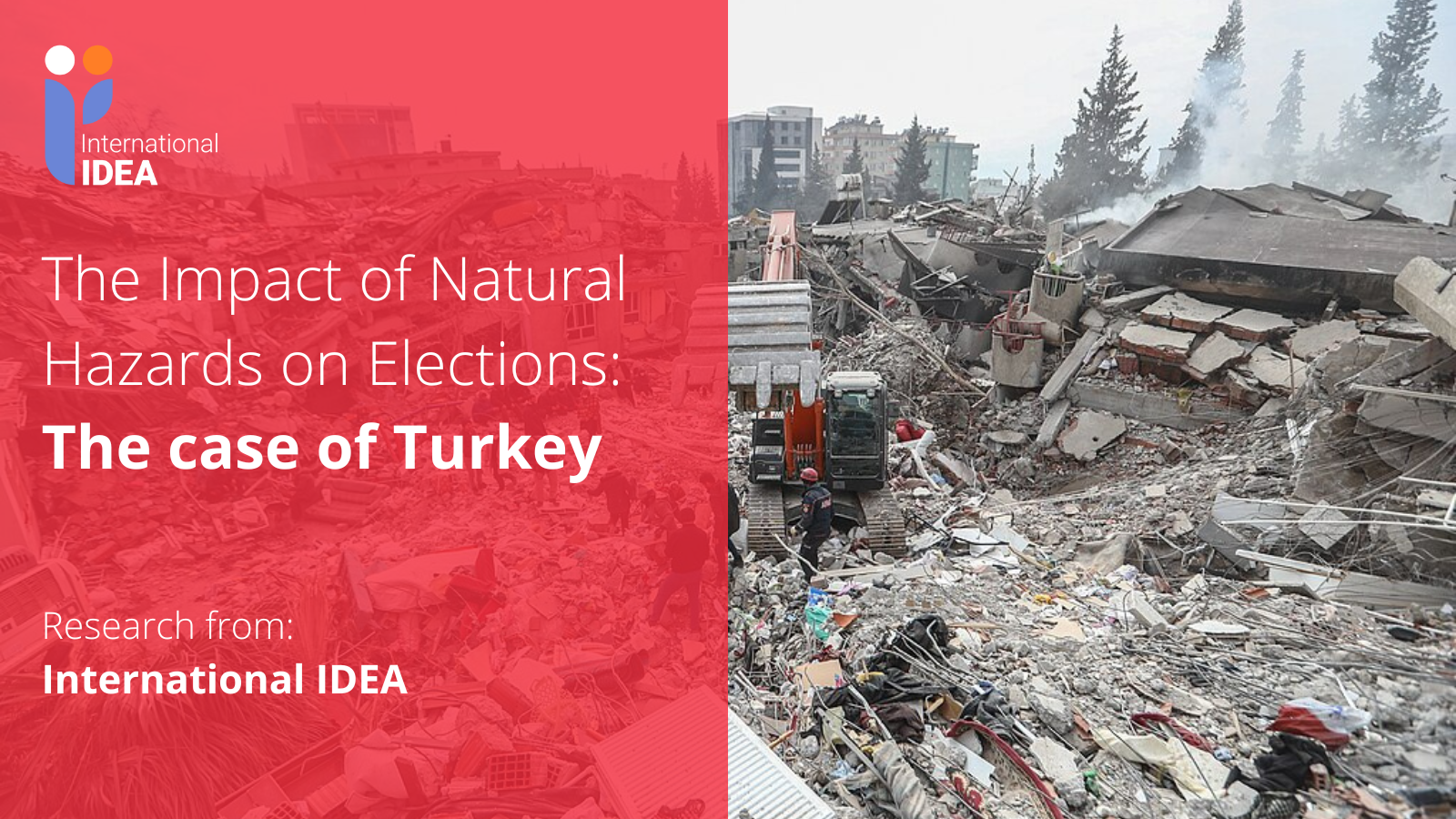 |
THE IMPACT OF THE 2023 EARTHQUAKES ON TÜRKIYE'S PRESIDENTIAL AND PARLIAMENTARY ELECTIONS Case Study, March 2024 With over 50,000 fatalities and 100,000 civilians left injured, the earthquake, which took place in Türkiye on 6 February 2023, had devastating impacts on the southern provinces. In the wake of the tragedy, two opposing opinions on how to respond to the crisis emerged: one in favor of swift elections and another demanding postponement. Additionally, officials debated the practicality of holding elections following such a destructive disaster that left surviving residents without documentation. This guide exemplifies the importance of administrative authorities having planned out procedures for unforeseen disasters to avoid prolonging the administrative response to natural disasters. |
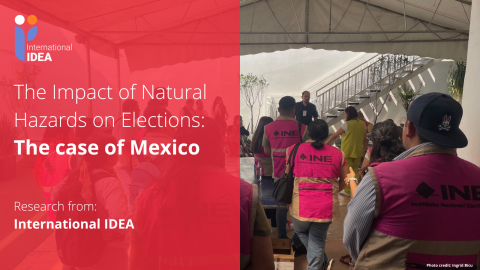
|
HEATWAVES AND THE 2024 Case Study: 9 June 2024 Mexico’s 2024 general elections took place amid record-breaking heatwaves, creating challenges for voters and election workers. Despite the extreme temperatures, electoral authorities successfully installed polling stations and ensured the elections proceeded smoothly. However, heat-related risks were not formally integrated into electoral risk management framework. This case study highlights the need to adapt election planning to a changing climate. As climate extremes become more frequent, Mexico’s experience offers key lessons for building more resilient electoral processes. |
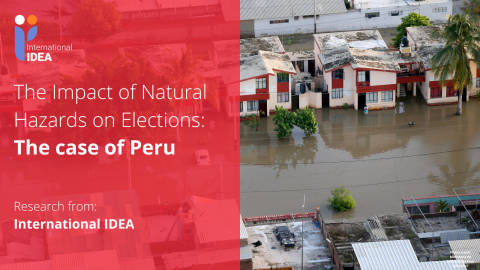
|
MANAGING ELECTIONS TO WITHSTAND NATURAL HAZARDS: THE CASE OF PERU Case Study: 11 September 2025 Peru faces frequent natural hazards such as floods and landslides, threatening infrastructure critical to electoral processes. This study examines how the National Office of Electoral Processes (ONPE) managed risks during the 2022 regional and municipal elections. It highlights ONPE’s use of a risk matrix, staff training, and the strategic increase of polling stations to prevent and mitigate potential disruptions caused by disasters. |
|
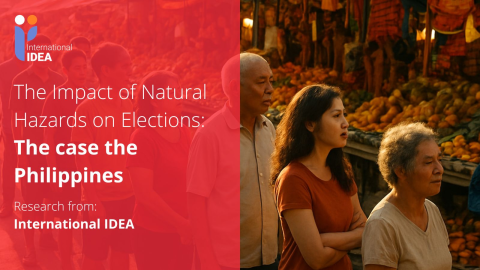
|
ELECTIONS AND HEATWAVES: PHILIPPINES' MAY 2025 GENERAL ELECTIONS Case Study: 30 January 2026 The 2025 Philippine national and local elections were held amid one of the country’s longest and most intense heatwaves, with heat indices climbing to 42–47°C across several regions. These conditions affected logistics, campaigning and election-day operations. Despite these challenges, the Commission on Elections successfully managed voting on 12 May 2025. This case study highlights how COMELEC and partner agencies adapted to extreme heat, revealing both strong institutional resilience and gaps in climate‑risk planning. |
International IDEA’s analyses and publications on natural hazards and electoral processes
Reports
Articles
- The Global Election Monitor: Tracking Electoral Integrity Challenges and Innovations (21 August 2025)
- When disasters disrupt democracy: The impact of extreme weather on the 2024 super-cycle year of elections (18 July 2025)
- Protecting elections in times of crises (15 May 2025)
- The 2024 election year in review: Climate at the ballots? (18 December 2024)
- Mapping Disasters and Responses during Elections (21 November 2024)
- What Hurricane Helene might mean for voting in the 2024 presidential elections in the states most affected (LSE USAPP, 3 October 2024)
- Heatwave risk and election safety: does it make sense to hold elections in July? (Consitution Unit, 23 June 2024)
- Protecting elections in the face of natural hazards (Preventionweb.net, 20 June 2024)
- Reducing the environmental impact of elections: Lessons from the Asia-Pacific (3 June 2024)
- Managing elections after earthquakes – Challenges for Türkiye (11 May 2023)
- Quake aftermath poses questions on timing and conditions for Turkey elections (LSE, 17 February 2023)
- How hurricanes threaten U.S. elections and why more flexible voting is needed (3 November 2022)
- Wildfires, hurricanes, floods and earthquakes: How elections are impacted by natural hazards (1 September 2022)
Podcast and Videos
- Stockholm Series #7: Voting in Times of Climate Change: What Extreme Weather Events mean for Electoral Management (9 June 2025)
- Peer-to-Peer: Climate Hazards and Elections in India (27 May 2024)
- Peer-to-Peer: Storms, Votes, and Reforms: How Climate Change Affects Elections (16 October 2024)
- Peer-to-Peer: How natural disasters affected the 2010 elections in Haiti (10 January 2023)
- Peer-to-Peer: The impact of cyclones on Mozambique elections (22 December 2022)
- Peer-to-Peer: The Impact of wildfires on US elections (22 November 2022, recorded on 16 November 2022)
- Peer-to-Peer Trailer: The impact of natural disasters on elections (7 November 2022)
Advocacy
Election Emergency and Crisis Monitor: Mapping impact and response to disasters, UNDRR Global Platform for Disaster Risk Reduction, Geneva, Switzerland (4 June 2025)
2024 Electoral Emergency and Crisis Timeline by International IDEA (18 December 2024)
Press Release by International IDEA - New Dashboard Tracking the Growing Impact of Extreme Weather on Elections Globally (12 November 2024)
Final Declaration from Parliamentary Conference on "Elections in Times of Crisis" Challenges and Opportunities (10 May 2023)
Statement by International IDEA at the Summit of the Future consultation on Emergency Platforms (17 March 2023)
Statement by International IDEA at the UN Informal Consultation on the Midterm Review of the Sendai Framework (27 February 2023)
Submission by International IDEA to the Parliament of Australia Joint Standing Committee on Electoral Matters: Inquiry on the Future of Elections Operating during Times of Emergency (13 November 2020)
Capacity Development
-
Capacity development workshop on protecting elections in Panama (15 April 2025)
-
Capacity development workshop on protecting elections in Finland (28 November 2024)
-
Mauritius: Strengthening capacity to protect elections (29 May 2024)
Additional Resources
Contributors
The project is led by Erik Asplund (International IDEA), Sarah Birch (King's College, University of London), and Ferran Martinez i Coma (Griffith University)
Case study authors: Wendy Adrianzen Rossi (Universidad Peruana de Ciencias Aplicadas), Saket Ambarkhane (Independent consultant), Erik Asplund (International IDEA), Sarah Birch (King's College, University of London), Holly Ann Garnett (Royal Military College of Canada), Valere Gaspard (University of Ottawa), Nicole Goodman (Brock University), Ferran Martinez i Coma (Griffith University), Irma Méndez de Hoyos (Latin American Faculty of Social Sciences), Jeff Fischer (Independent consultant), Madeline Harty (independent consultant), Hyowon Park (independent consultant), David Towriss (International IDEA), Marietha Pérez-Arellano (Centre for Economic Research and Teaching), Yogi Setya Permana (Royal Netherlands Institute of Southeast Asian and Caribbean Studies), Domingos M. Rosario (Eduardo Mondlane University), Emre Toros (Hacettepe University), Rafael Arias Valverde (Pontificia Universidad Católica del Perú), Mubera Vulovic (CEC B&H).
To cite this report: Asplund, E., (editor), 'The Impact of Natural Hazards on Elections', International IDEA, 1 September 2022 (and updated)
